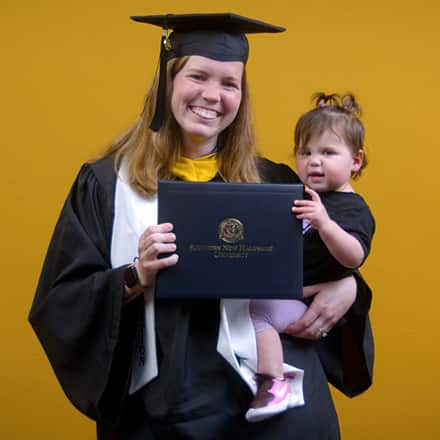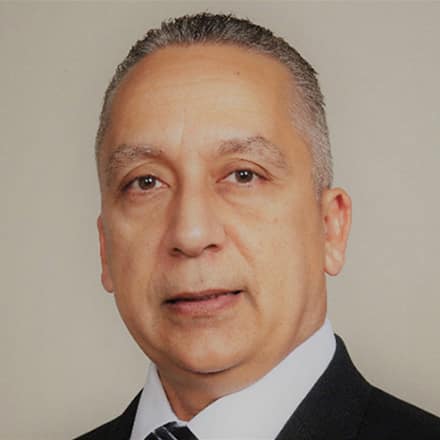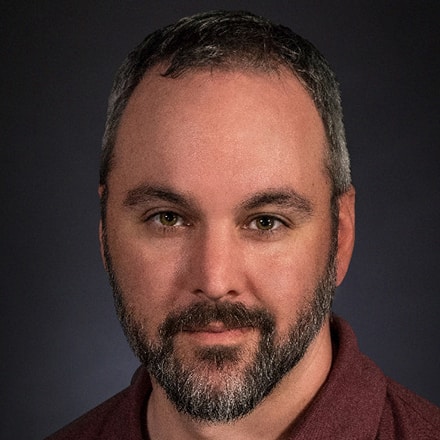Academic Spotlight: Associate Dean of Social Science Dr. Tharinia Oyegun

Dr. Tharinia Oyegun — or Dr. T — spent her career in criminal justice and forensic science working in juvenile probation, the coroner’s office and the Transportation Safety Administration before she retired and began teaching in higher education. She earned her master’s in forensic sciences from National University and a PhD in Human Services with a Criminal Justice specialization from Capella University.
Now an associate dean of social sciences at Southern New Hampshire University, she recently answered questions about the importance of education and how she connects with online students.
Can you tell us about your professional background?
I would like to think of myself as being fortunate to have dual careers that sort of just happened. It is rare that one gets to work almost concurrently in two career paths that they enjoy so much.
During my career I interchangeably worked in both the criminal justice and forensic science fields throughout Southern California. Juvenile probation, coroner’s office, and TSA are some of the agency experiences for which I have been grateful to have had fantastic opportunities. However, the latter part of my career I spent working within the forensic science field and retired as a Questioned Documents Examiner.
What first drew you to higher education?
I always knew that once I retired, I wanted to teach criminal justice and forensic science at the college level. I started teaching in higher education as an adjunct while still in the field. Comments from students that resonated with me and confirmed my reason for wanting to teach at the college level was a simple one: It is great to have a professor who has actually worked in the field.
I see criminal justice and forensic science students in colleges across the country as those replacing folks like me in the field. They need former professionals in the classroom(s) showing them that not everything in the field is textbook.
One of the officers in my class once told me that I had him “sold” day one when (I) laid the course text on the desk and said, “This is what your textbook says…this is what can and does happen in the real world.” He stated up to that point, he had only had professors that had never worked in the field. He said good professors, but just did not have any real-world training. This again confirmed that my decision to teach my disciplines in higher education was the best choice I ever made. It is an added bonus to not only have that education but also that experience to share with students.
What aspects of your own education have been influential in shaping your career in academia?
The aspect(s) of my education journey that has been influential in shaping my career in academia would be that of being more approachable to students and not that “I am the professor, you are the student, so what I say goes” mentality that was experienced here and there (the majority of my professors were outstanding) on my educational path. My mindset has always been that if I ever got the opportunity to teach in higher education, I would be opposite of some professors that I encountered in my educational journey.
For example, not only do I make myself more personable, but I also do things such as provide EVERY student I encounter with extensive assignment feedback on any assignment submitted to me. Yes, it is time-consuming for me. However, during my educational journey it was bothersome to receive assignment feedback, if at all, with either only a grade or a grade and one or two lines. How was I to know what went wrong and how can I improve?
Another thing I also try to do because of my educational experiences is to incorporate real-world knowledge into my courses to help students see how what they do in the course room translates to the real world.
For example, some of the same students the entire course may be late with assignments weekly. I try to make the class as a whole (so as not to single out a student) connect how in the real world in our field(s) tardiness could have swift penalties (e.g. late for court, bench warrants issued, cases delayed) and encourage them to view the courses as preparation for the field and not just a grade on a transcript.
Essentially, I’m trying to get them to correlate time management in the course with time management in the field/casework for which they are trying to seek entry. That real-world application or connectivity was something that was not presented in my educational journey and I like to make that a staple in my courses when I teach.
I cannot get students into a crime lab or ride along, but thanks to technology, I can integrate some great videos in my announcements to demonstrate the importance of our jobs in the fields of criminal justice and forensic science. These disciplines go beyond just us. We are dealing with people’s lives. These are not your typical 9 to 5 career paths.
So, I guess making sure that students not only have the book knowledge but also some real-world insight that I did not have a wealth of during my educational journey has shaped my time and career in academia tremendously.
What attracted you to this field of study? What keeps you excited about it?
Like many students entering college, I really didn’t have a plan of study. I was just going off to college because it was something I was “supposed to do.” Once in college, I spent my first two semesters as a psychology major and just was not feeling it. Then I decided to take an elective in criminal justice, and everything made sense to me. I was hooked and changed my major.
I continued that field of study until a few terms into my master’s program then I took a forensic science course. It was love at first sight. I changed my degree program to forensic science.
However, to me both are like being asked to pick your favorite kid. We’re not supposed to have one if asked…but we all know we secretly have one. I won’t say which field is my favorite.
How have you found ways to effectively connect with students?
One way in which I initially try to connect with students is by the way I’d like to be addressed in the course, Dr. T. Students are already intimidated because of the stigma of the us and them or hierarchy in the course room of the instructor is the Alpha dog. I don’t think that I need to come in establishing my dominance. I know I’m the instructor, they know I’m the instructor so let’s not focus on that and move on to the heart of it all, the learning.
Additionally, I always speak in relatable terms in my courses. I love to give examples that students can relate to when speaking on course topics. I’m a visual learner and so are a lot of students so I like to give videos when applicable or verbal imagery when trying to get students to understand a concept.
For example, citations and reference lists are always a concept that students have trouble grasping, among other APA requirements. Students often think that using one or the other is ok when it comes to citations and reference list. It wasn’t until I gave this image that a student told me he finally got it. I guess the entire class also got it because I started seeing vast improvements. What did I say? “Citations and reference lists go hand in hand; it’s like a cowboy in a movie showing up at high noon to a gunfight with no ammo, that gun won’t be very effective, will it?.”
Or when I give scenarios about why it’s important to be thorough with assignment topics, I ask students to think what if this were their case or loved one’s case how would one feel about a few lines summing up the whole case and your freedom hinges on those few lines. Using imagery or scenarios that make students stop and imagine seems to be an effective way that I’ve found to make that connection with the students.
What brings you the greatest joy in your work as an associate dean?
The greatest joy of working as an associate dean is being in an even greater position to effect change more so than my previous roles serving students. Being that student advocate by ensuring that the programs that they are within are quality and effectively serving them as dean is a great task and a great responsibility that I take pride in.
When one attends a commencement ceremony and see students complete that final academic milestone is a feeling that can’t even be put into words. You are not only seeing your students’ hard work paying off but also pride in that you were in some way instrumental in that success because your work as associate dean had a hand in that as well.
What do you feel is unique about the faculty and students you work with?
The faculty and students in social sciences ROCK! Specifically in the Criminal Justice and Human Services (the programs for which I’m responsible) programs. We not only ROCK we also ROLL. So, move out of our way because we are moving and shaking things up.
I have great faculty who are field professionals who give their all to our students. I think the fact that we have so many professors who are still employed or retired from within the criminal justice and human services fields is extremely unique.
Our students are fortunate to have access to such criminal justice and human services high ranking individuals from agencies across the country. Equally, we have a lot of dedicated students who are taking advantage of these real-world experiences being provided to them. Did I say we ROCK!?
What does SNHU’s mission to transform the lives of learners mean to you?
SNHU’s mission of transforming lives of learners is something besides just words in a mission statement on a piece of paper. The fact that we all live this mission and assist with making these words have meaning and come to fruition is simply magical. Just attend a commencement and one will see those words become one big action verb.
Outside of work, what’s something you’re passionate about or really enjoy doing?
When I’m not working, I enjoy just being somewhere on a cruise ship. Even if the ship decides to go nowhere someday, I don’t care.
I also enjoy giving back to my community and do so through organizations such as my sorority, church, or connections with my academic colleges from my previous employment. I guess I should include spending time with my family in this too? Yep, them too. They haven’t paid me for that honorable mention yet.
A degree can change your life. Choose your program from 200+ SNHU degrees that can take you where you want to go.
Joe Cote is a writer and organic marketer at Southern New Hampshire University (SNHU), where he has worked since 2016. Previously he spent more than a dozen years as a reporter and editor at weekly and daily newspapers in Vermont and New Hampshire. He lives near SNHU's Manchester, New Hampshire campus with his wife and daughter. Connect with him on LinkedIn.
Explore more content like this article

What Do Sociologists Do? The Surprising Paths You Can Take

SNHU Spotlight: Alyson Mullen, BS in Criminal Justice Grad

Academic Spotlight: Dr. Hector Garcia, Associate Dean of Criminal Justice
About Southern New Hampshire University

SNHU is a nonprofit, accredited university with a mission to make high-quality education more accessible and affordable for everyone.
Founded in 1932, and online since 1995, we’ve helped countless students reach their goals with flexible, career-focused programs. Our 300-acre campus in Manchester, NH is home to over 3,000 students, and we serve over 135,000 students online. Visit our about SNHU page to learn more about our mission, accreditations, leadership team, national recognitions and awards.


